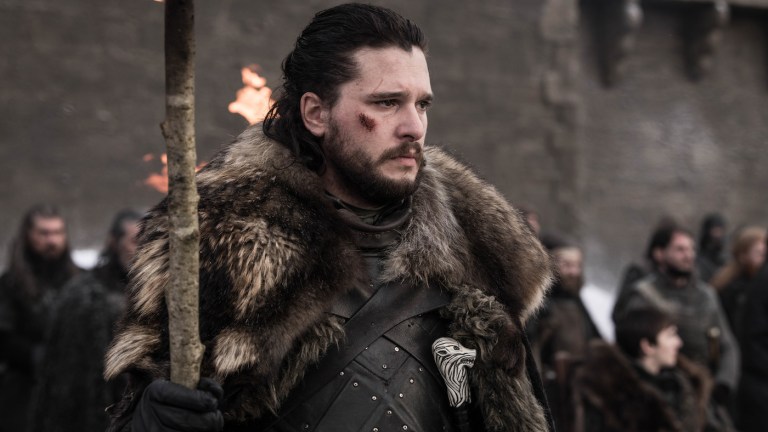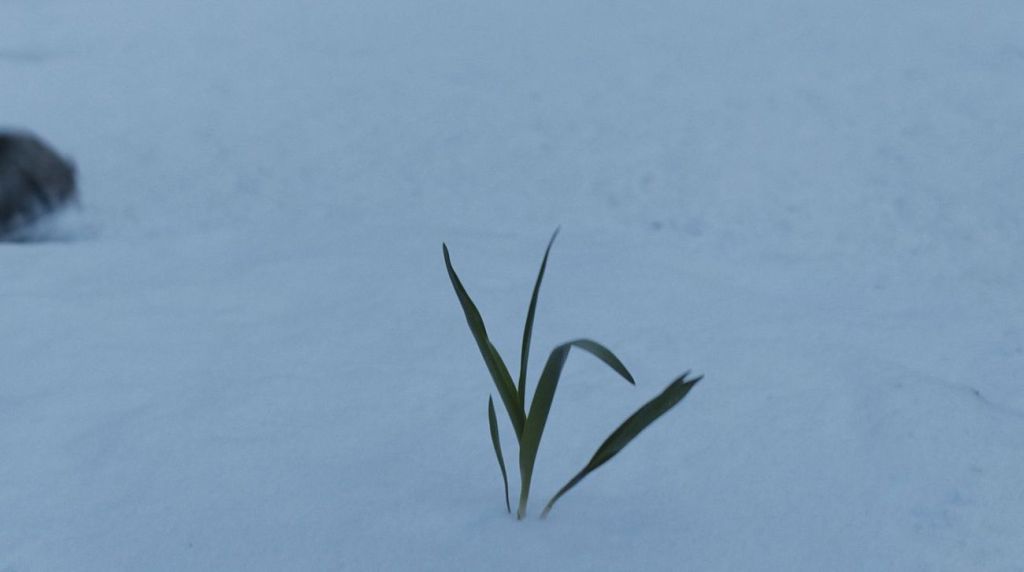The Game of Thrones Finale Shot That Could Set Up Jon Snow Series
News of a Jon Snow spinoff series hits like a thunderbolt. Yet there is one interesting direction they could take the show…

In the current age of multi-pronged media management strategies, stories don’t so much end as expand. So the revelation that HBO was developing multiple Game of Thrones spinoffs, even before that iconic series ended, was hardly a surprise. At one point, HBO had as many as eight potential series set in George R.R. Martin’s World of Ice and Fire in development. And while not all of them would be greenlit, they were each assumed to have one thing in common: these were prequels. Stories set before the events of Martin’s “A Song of Ice and Fire,” the book series that Game of Thrones is based on.
That all changed with the bombshell report late Thursday night that Kit Harington has signed onto what is essentially a Game of Thrones sequel where we will follow his character Jon Snow on further adventures. The Hollywood Reporter broke the story before HBO or Harington could officially announce the project—or notably provide any context, including a logline. Nonetheless, the news has left fans reeling. Another Game of Thrones spinoff is in development before the first actual greenlit series, House of the Dragon, has even hit television screens?
Personally, the bit I’d like to most hear about is what Martin thinks of all this. Previously, it was understood that HBO would play around in the world he created with thousands of years of history and lore to draw upon. House of the Dragon, for example, will be based on a bloody civil war, the grisly details of which are recounted across 300 pages in Martin’s larger fictional history text on the Targaryen family, Fire & Blood. The one consistent thing among all these projects, however, is that they wouldn’t build on top of the ultimately controversial ending to Game of Thrones, which Martin gave to series showrunners David Benioff and Dan Weiss many years ago.
And, indeed, one might think it could be a touchy subject for many fans to pick up off the back of that Game of Thrones series finale, which saw Jon Snow kill the woman he loved, Daenerys Targaryen (Emilia Clarke), after she gave into her demons and more bloodthirsty impulses. Jon’s fate seemed especially final, too, since he was sentenced (or blessed) with a glorified banishment: he would serve out the remainder of his days on the Wall, the only place he’d ever been truly happy. Better still, he would get to live Beyond the Wall, acting as a ranger who is “escorting” the wildlings back to their home.
What could a new TV show be about beyond his living in a frozen tundra far from the reach of courtly intrigue and palace politics?
Well, for starters, if the series makes good on the most interesting tease in Game of Thrones’ final scene, it shouldn’t be a frozen wasteland. At least not for long.
An element a lot of folks tend to overlook about the Game of Thrones finale is how it is about tearing down the entire old world built by families like the Targaryens and the Lannisters, and even the Starks. While three of the children of Winterfell grow up to rule the larger Westerosi continent, Bran (Isaac Hempstead Wright) will be the first king ever devoid of the vanities and ambitions that corroded the souls of other monarchs. More satisfyingly still, Sansa (Sophie Turner) becomes the real queen audiences wanted, winning back the North’s independence without directly causing a single death (although poisoning Varys against Dany is morally a lot murkier); she proves winter truly is a time for wolves; and Jon is all but guaranteed to become a king of sorts beyond the Wall.

And yet, the other thing folks tend to gloss over about the ending is the realization that there soon won’t even be a Wall. Aye, the final shot includes a blade of grass sticking out from the wintry snow beneath the wildlings’ feet. This grass signals that spring is coming—even to this land of eternal winter.
It’s worth remembering that there has been little vegetation beyond barren trees growing beyond the Wall since the War of the First Men and the Children of the Forest 10,000 years ago. In Game of Thrones, it’s even strongly implied winter came because the Children of the Forest created the Night King to kill the warlike First Men. The arrival of the White Walkers caused their veritable Eden to become buried beneath mountains of ice.
But with a blade of grass growing in the first spring since the Night King’s destruction, the implication is that the true long night has ended, and spring is coming even for people as abandoned and supposedly hopeless as the wildlings. And with that upheaval, we can expect an end to the old ways since a spring thaw will mean the end of the Wall, the Night’s Watch, and the entire idea of a border between wildlings and the Seven Kingdoms.
When the implications are considered, a series about Jon Snow at the turning of this tide in Westerosi history and culture could promise something entirely original. Unlike House of the Dragon, which returns to the familiar sight of scheming courtiers in King’s Landing and (eventually) armies decimated by dragonfire, a series set in a Westeros without the Wall, without the existential threat of White Walkers, and without the shadow of the Targaryens looming over every decision could strike an entirely different chord. If the end of Game of Thrones is about renewal—renewal of the Starks’ legacy, a renewal of civic mindedness from rulers, and the literal renewal of spring—could there even be room for a story where Westeros finally leaves its long, long medieval system and reaches toward its own version of the renaissance?
… Mayhaps. Although, if we’re being honest, the prospect of imagining what might come next after that conclusion is probably more satisfying than trying to map it out in a weekly television series. Additionally, there is the still larger caveat that this would be the first announced Game of Thrones spinoff that has no source material from Martin to draw upon; no Old Nan bedtime stories about the Long Night; no short novella in which the adventures of a hedge knight and his witty sidekick thrill and entertain; and no extensive family history meticulously laid out in the book Martin decided to focus on ahead of finishing The Winds of Winter.
Rather this would be flying completely blind into the unknown. Given how much HBO struggled at other moments in building Westeros when left to an outline from Martin and their own devices, that should give pause.
